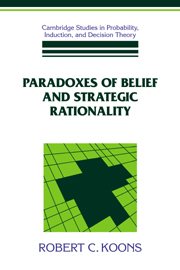Book contents
- Frontmatter
- Contents
- Preface
- Introduction
- Part I Paradoxes
- 1 Doxic paradoxes without self-reference
- 2 Doxic paradoxes and reputation effects in iterated games
- 3 A study of liar-like epistemic paradoxes
- 4 A computational account of mutual belief
- Part II Solutions
- Conclusion
- Appendix A Applying probability to mathematical sentences
- Appendix B Proofs of Theorems 2 and 3 from Chapter 6
- Appendix C On schematic generalization
- Bibliography
- Index
2 - Doxic paradoxes and reputation effects in iterated games
Published online by Cambridge University Press: 06 January 2010
- Frontmatter
- Contents
- Preface
- Introduction
- Part I Paradoxes
- 1 Doxic paradoxes without self-reference
- 2 Doxic paradoxes and reputation effects in iterated games
- 3 A study of liar-like epistemic paradoxes
- 4 A computational account of mutual belief
- Part II Solutions
- Conclusion
- Appendix A Applying probability to mathematical sentences
- Appendix B Proofs of Theorems 2 and 3 from Chapter 6
- Appendix C On schematic generalization
- Bibliography
- Index
Summary
A Bayesian approach to game theory seeks, as the solution of a game, the rational decision for each agent to make at each decision point. A rational decision is one that maximizes the utility of the agent, given his beliefs, which are themselves rationally generated from the information available to the agent. Therefore, such an approach must rely on a formal theory of rational belief. This suggests the possibility that doxic paradoxes arise in some game-theoretically described situations. In this chapter, I will argue that this possibility is in fact the case. Doxic paradoxes arise in any game in which all of the Nash equilibria involve noncentroid mixed strategies. I will discuss one example of such games: iterated games involving reputation effects.
In Section 2.1, I will discuss the problem about correctly characterizing the rational choices in such iterated games, which Selten labeled the chain-store paradox. In Section 2.2, I will isolate the doxic paradox that arises in such games. By replacing the notion of rational belief with that of rational subjective probabilities, one can avert this paradox by means of probabilistically mixed strategies. In Section 2.3, I argue that solutions involving noncentroid mixed strategies are not in general satisfactory, and in Section 2.4 I show how the doxic paradox can be reinstated if such strategies are ruled out. Section 2.5 contains a comparison of the notion of doxic paradox with Roy Sorensen's notion of doxic blindspot. Unlike my account, Sorensen's leaves the possibility of such blindspots unexplained.
SELTEN'S PARADOX OF REPUTATION
Game theorists have discovered several scenarios involving the finite repetition of a noncooperative game that give rise to a certain kind of “paradox.”
- Type
- Chapter
- Information
- Paradoxes of Belief and Strategic Rationality , pp. 24 - 42Publisher: Cambridge University PressPrint publication year: 1992

